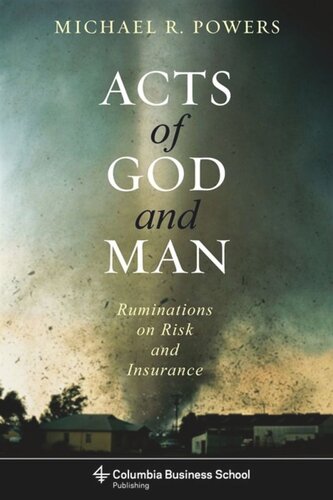

Most ebook files are in PDF format, so you can easily read them using various software such as Foxit Reader or directly on the Google Chrome browser.
Some ebook files are released by publishers in other formats such as .awz, .mobi, .epub, .fb2, etc. You may need to install specific software to read these formats on mobile/PC, such as Calibre.
Please read the tutorial at this link: https://ebookbell.com/faq
We offer FREE conversion to the popular formats you request; however, this may take some time. Therefore, right after payment, please email us, and we will try to provide the service as quickly as possible.
For some exceptional file formats or broken links (if any), please refrain from opening any disputes. Instead, email us first, and we will try to assist within a maximum of 6 hours.
EbookBell Team

4.4
22 reviewsMuch has been written about the ups and downs of financial markets, from the lure of prosperity to the despair of crises. Yet a more fundamental and pernicious source of uncertainty exists in today's world: the traditional "insurance" risks of earthquakes, storms, terrorist attacks, and other disasters. Insightfully exploring these "acts of God and man," Michael R. Powers guides readers through the current methods available for identifying and measuring such risks, financing their consequences, and forecasting their future behavior within the limits of science. He concludes with an interdisciplinary investigation into the nature of uncertainty, incorporating ideas from physics, philosophy, and game theory to assess science's limitations in predicting the ramifications of risk.
Much has been written about the ups and downs of financial markets, from the lure of prosperity to the despair of crises. Yet a more fundamental and pernicious source of uncertainty exists in today's world: the traditional "insurance" risks of earthquakes, storms, terrorist attacks, and other disasters. Insightfully exploring these "acts of God and man," Michael R. Powers guides readers through the methods available for identifying and measuring such risks, financing their consequences, and forecasting their future behavior within the limits of science.
A distinctive characteristic of earthquakes, hurricanes, bombings, and other insurance risks is that they impact the values of stocks, bonds, commodities, and other market-based financial products, while remaining largely unaffected by or "aloof" from the behavior of markets. Quantifying such risks given limited data is difficult yet crucial for achieving the financing objectives of insurance. Powers begins with a discussion of how risk impacts our lives, health, and possessions and proceeds to introduce the statistical techniques necessary for analyzing these uncertainties. He then considers the experience of risk from the perspectives of both policyholders and insurance companies, and compares their respective responses.
The risks inherent in the private insurance industry lead naturally to a discussion of the government's role as both market regulator and potential "insurer of last resort." Following a thoughtful and balanced analysis of these issues, Powers concludes with an interdisciplinary investigation into the nature of uncertainty, incorporating ideas from physics, philosophy, and game theory to assess science's limitations in predicting the ramifications of risk.